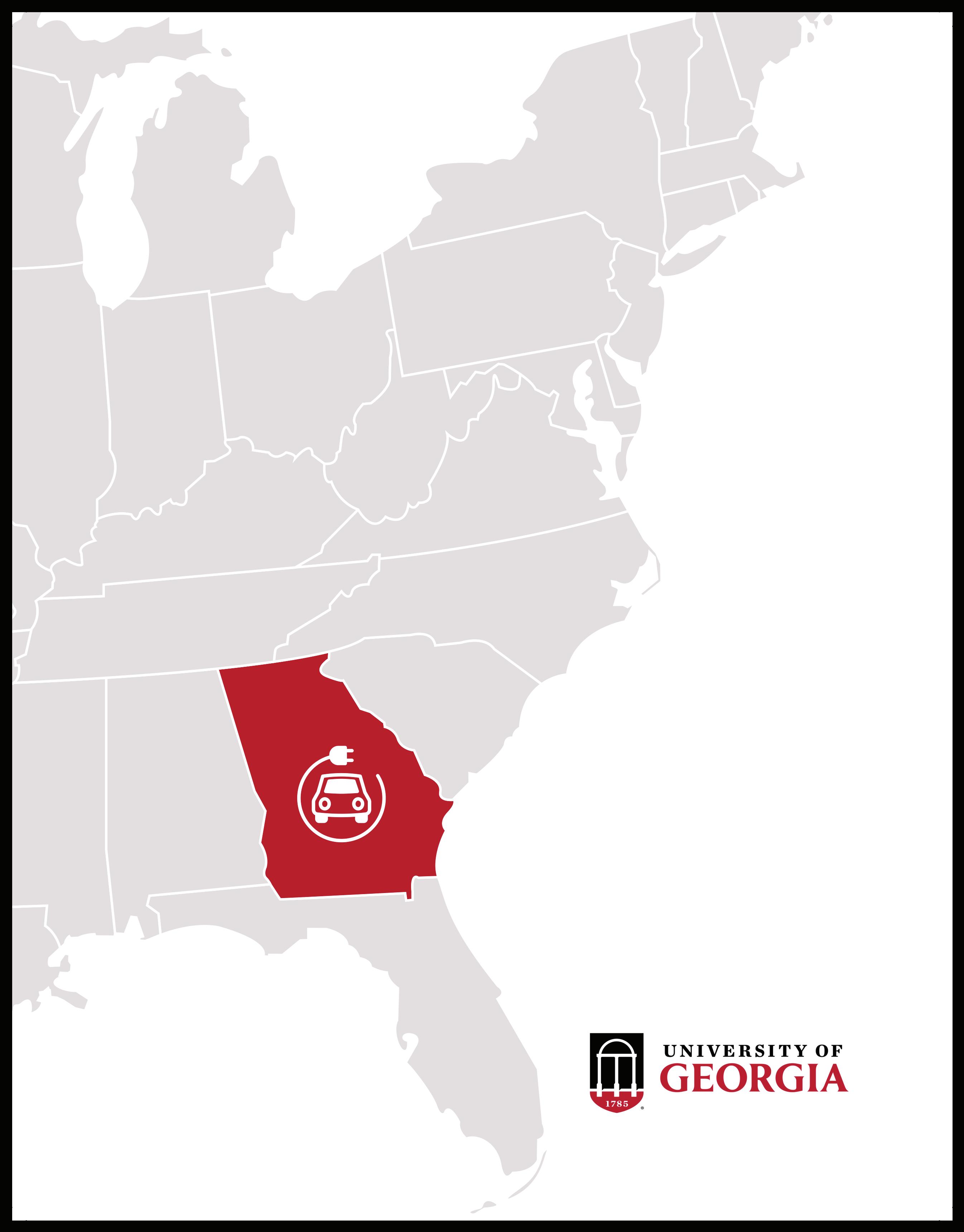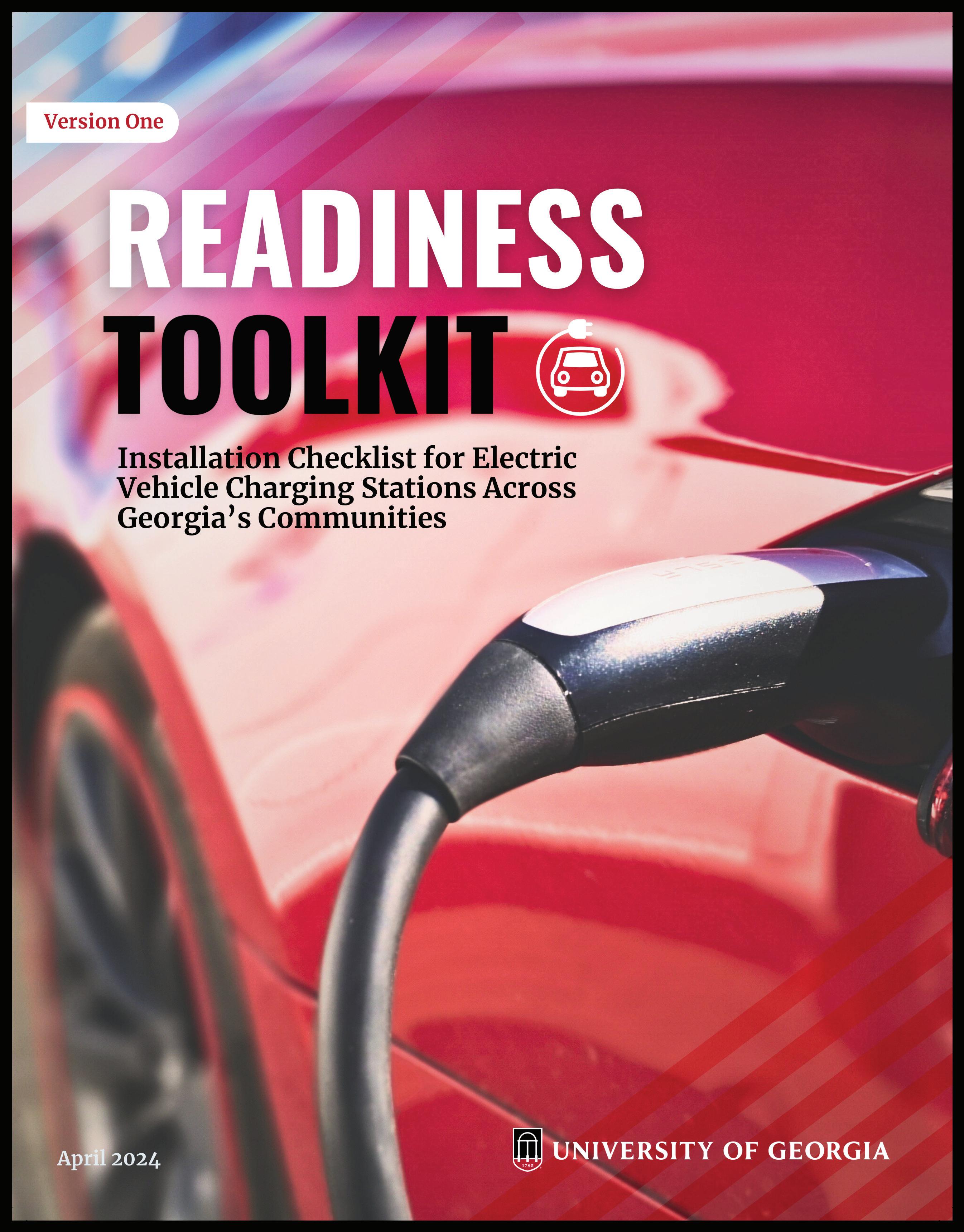STEP ONE: CHARGING STATION INFRASTRUCTURE PLANNING
EV Charger Infrastructure Assessment
The current and projected landscape of EV charging infrastructure is the first step in the process of procuring and installing charging stations. Identifying the necessity for charging stations involves foundational research and collaboration with stakeholders. This segment provides an outline of recommended background research, potential stakeholders, an overview of stakeholder meetings, and additional necessary engagement opportunities, laying the groundwork for installation of charging stations.
Identify the Need for Public Charging Stations
• Locate current EV charging station(s) in or around your community through maps such as the U.S. Department of Energy map or PlugShare’s EV station locator
• Research GDOT’s electric vehicle infrastructure deployment plan to determine if the alternative fuel corridor interacts with your community
• Brainstorm potential location of charging station(s) taking into consideration traffic flow, proximity to businesses and restaurants, and ADA Accessibility
• Contact local businesses to identify potential plans to install charging stations in the near future
• Understand the level and quantity of chargers that may be ideal for your community (ex: Level 1, 2, or 3/DC Fast Chargers)
• Learn more about electricity basics and infrastructure
Policies and Permitting Requirements
Learning more about ordinance requirements, policies, permitting, and emergency preparedness associated with charging stations will provide direction as this project progresses. Discussions with charging station providers and utility companies will also aid in navigating these policies. Additionally, connecting with your public service staff and first responders to ensure policies and processes have been considered will support a successful charging station implementation.
Regulatory Framework
• Review local ordinances associated with EV charging station planning and zoning
• Understand the permitting process for charging station installation (USDOE Information)
• Ensure compliance with state and federal regulations related to EV charging
• Learn more about the application process for any necessary permits
• Analyze current local ordinances and consider revising to include charging infrastructure in future developments (Sample model ordinance)
Readiness Toolkit: Installation Checklist for Electric Vehicle Charging Stations Across Georgia’s Communities (Version One / April 2024) Page 4
Parking Policies
• Consider ways to enforce proper charging etiquette such as charging time limits or fines for non-electric vehicles parking in EV designated spots
• Review parking policies to accommodate electric vehicle charging needs
• Research signage and parking design for spots to be clearly marked and accessible
Emergency Preparedness
• Communication and training plan for emergency services pertaining to EV charging safety
• Consider power grid or supply issues due to natural disasters as well as potential fire and electrical hazards
Technology and Broadband
• Explore technology of charging stations, including payment systems and real-time monitoring
• Learn more about broadband in your community and smart charger network requirements
Funding and Incentives
Funding and incentives are available to assist with the purchase and installation of charging station(s). Before looking at potential funding opportunities, it may be beneficial to understand the costs required for the infrastructure surrounding the charging station. In addition to these opportunities, you may also connect with private entities for potential funding opportunities or cost-share programs.
Cost Analysis
• Gain understanding of projected implementation and installation costs, such as infrastructure costs, equipment, signage and parking requirements, software and data management.
• Research estimated cost of charging, including time-based fees, cost competitiveness of charging compared to gasoline refueling. Note: this will depend on electric rates and fuel prices within the community
Incentives, Funding, and Rebate Opportunities
• Explore grants and funding opportunities to support charging infrastructure projects
• Georgia Environmental Finance Authority’s (GEFA) Clean Communities Initiative and GRIP: provides financial assistance for alternative fuel infrastructure projects in rural communities across Georgia
• Federal Highway Administration’s (FHA) Congestion Mitigation and Air Quality Improvement Program supports EV infrastructure investments
• Federal sources
• Electric Vehicle Infrastructure Program (EVIP): provides grants to local governments, states, and private entities for EV charging infrastructure
• Georgia Power Company rebates
• Make Ready Program

Readiness Toolkit: Installation Checklist for Electric Vehicle Charging Stations Across Georgia’s Communities (Version One / April 2024) Back to the Table of Contents

Community Charging Program
EV Charger Rebate
State sources
Georgia Department of Economic Development: tax credits to businesses for the purchase of qualified zero-emission vehicles
• Georgia Alternative Fuel Vehicle Infrastructure Tax Credit: provides tax credits up to 20% for the purchase of EV vehicles and alternative fuel infrastructure, including EV Charging stations
• Tailored incentive programs and custom financing for local communities from private entities (EMCs, EnviroSpark, ChargePoint, etc.)
• Establish partnerships with local businesses, utilities, and EV manufacturers for potential funding opportunities
STEP TWO: STAKEHOLDER AND COMMUNITY ENGAGEMENT
Engage with Stakeholders
In addition to appointing a project champion, community input and engagement represent vital components of the installation process. It is recommended to host a stakeholder meeting involving various participants such as local government officials, city or county staff, administrators, businesses, residents, community organizations, utilities, and coalitions. As partnerships with stakeholders are developed, explore the potential for incentives or costshare programs offered by some of these entities to support the project.
Potential Stakeholders
• If your community is a Georgia Power Company customer, contact your regional or local representative
• Local EMC or other Electric Utility Providers
• Local government departments including transportation, fleet, public works, public safety, finance/procurement, and sustainability divisions
• Local businesses (especially within walking distance) to the potential charging station site locations as EV drivers may visit businesses while they charge
• Regional Commission staff
• Drawdown Georgia, Clean Cities Georgia, and other local or regional partners
Local Utility Connections
• Plan a meeting to evaluate existing electrical infrastructure for compatibility and capacity
• Determine electrical capacity necessary and if current transformer(s) are sufficient
• Discuss parking facilities for accessibility and convenience
Individual Stakeholder Engagement
• Connect with your utility to learn about grid readiness
• Engage with charging infrastructure providers (Georgia Power, ChargePoint, EnviroSpark, Etc.)
Readiness Toolkit: Installation Checklist for Electric Vehicle Charging Stations Across Georgia’s Communities (Version One / April 2024) Page 6
• Locate your community on the broadband map and discuss with providers to ensure there’s sufficient broadband access for smart chargers
• Contact first responders to establish fire and safety protocol with the charger
Local Business Collaboration
• Consult with local businesses to understand their perspective on the potential economic impact and how designated EV parking may affect their customers
• Discuss how charging stations can contribute to increased foot traffic and sales
Stakeholder Meeting Recommendations
• Set meeting agenda and desired outcomes
• Delegate facilitator to manage the meeting
• Topics to cover include:
• Background information of current EV Infrastructure in the state and community
• Explanation as to why there is a need/want to install charger(s)
• Potential partnerships and funding opportunities
• Identify projected costs and fees
• Next steps and installation overview (see below)
• Future stakeholder meeting plan as project progresses
• Utilize inclusive decision-making to ensure this project is representative of all community members
STEP THREE: CHARGING STATION INSTALLATION
Installation and Operation
After hosting the stakeholder meeting and coordinating with your utility to select the charging station provider, the installation process will begin. During this phase, you may need to involve your city or county attorney, city council, and stakeholders to review contractual documents. As discussions progress with these entities, several pertinent questions may arise. Examples of these questions are as follows:
Questions and Topics to Discuss
• Confirm estimated timeline with project logistics and equipment delivery
• Discuss near and long-term charging requirements and pricing associated with changes in utility rates or electrical upgrades
• Discuss any networking or maintenance requirements
• Work with the team to set the charging rate
• Determine charging equipment ownership responsibilities
• Review required permits
• Address any inspection requirements and impacts on the project timeline
• Determine additional site needs, including signage, security, and safety
• Assess charging infrastructure maintenance and operation needs and costs

Readiness Toolkit: Installation Checklist for Electric Vehicle Charging Stations Across Georgia’s Communities (Version One / April 2024) Back to the Table of Contents

Select construction and electrical contractors
Establish a final site budget, including available incentives, project costs, and ongoing expenses/fees
STEP FOUR: COMMUNITY AWARENESS AND EDUCATION
Plan and Conduct Community Awareness Programs
Engaging the community and providing education on the deployment of Electric Vehicle (EV) Infrastructure represents a valuable approach to informing citizens about stakeholders, funding, and the project’s processes. Furthermore, it offers a broader perspective on EV access and charging station planning. Diverse educational initiatives offer multiple modes of engagement, facilitating community input into future EV plans.
Public Awareness and Education
• Review resources for community development opportunities
• Develop public awareness or press release for this project to educate community members about the benefits of EVs and charging infrastructure. Address questions such as:
• Which types of vehicles will this apply to?
• How long does it take to charge a car?
• Create an easily accessible resource such as signage, webpage, social media, or pamphlet that discusses the benefits of communities implementing charging stations
• Dedicate verbiage for the planners, stakeholders, installers and potential funders that have contributed to the installation in these outreach efforts
• Provide information on incentives for businesses to install charging stations
Local Events and Promotion
• Incorporate EV-related themes into local events to promote awareness
• Leverage community gatherings to showcase EV technology
Education and Feedback Opportunities
• Address updates and management of the charging station in town hall or public meetings
• Organize workshops or informational sessions to address questions about EV technology and charging infrastructure
• Utilize sessions to gather input and build community understanding
• Ensure transparency regarding the project’s goals and benefits
• Establish a community benefits agreement outlining the advantages the community will gain from the charging infrastructure
• Conduct surveys to gauge public opinion on EV adoption and charging infrastructure
Addressing Concerns
• Consider establishing a dedicated communication channel to address questions and concerns from community members and charging station users
Readiness Toolkit: Installation Checklist for Electric Vehicle Charging Stations Across Georgia’s Communities (Version One / April 2024) Page 8
• Identify and address common concerns such as the visual impact of charging stations, safety, and property values
• Provide clear information on how the charging infrastructure will benefit the community
Ongoing Community and Stakeholder Engagement
• Explore the possibility of community-supported programs for charging station installations
• Seek partnerships with local organizations to garner support for this project
STEP FIVE: ECONOMIC IMPACT, MONITORING AND EVALUATION
Future Monitoring and Economic Analysis Needs
The growing tourism industry in the state of Georgia presents communities with the opportunity to cater to a diverse array of travelers, including those utilizing electric vehicles. The distribution of charging stations throughout both urban and rural Georgia communities facilitates EV owners’ exploration of the state, potentially contributing to heightened tourism within local communities. During the charging process, tourists can discover new destinations, explore regional attractions, and patronize local establishments. Offering EV charging represents just one strategy that may foster increased tourism and economic growth for communities.
Economic Impact Analysis
• Assess the potential economic benefits of attracting EV users to the community and impact on local businesses, tourism, and job creation
• Implementation will facilitate tourism and local exploration – prepare businesses for potential increase in foot traffic
• Offer amenities such as EV-friendly parking spaces near public amenities with adequate lighting and signage
Monitoring and Evaluation
• Consider data collection techniques to monitor usage and costs of charging station(s) over time
• Establish a system for monitoring the usage of charging stations and collecting feedback
• Regularly research current policies, news articles, rate changes of charging stations

Readiness Toolkit: Installation Checklist for Electric Vehicle Charging Stations Across Georgia’s Communities (Version One / April 2024) Back to the Table of Contents

BIBLIOGRAPHY AND RESOURCES
Shown in order of appearance
U.S. Department of Energy. “Alternative Fuels Data Center - Find Alternative Fueling Stations.” Alternative Fuels Data Center. Retrieved from: https://afdc.energy. gov/stations#/find/nearest.
“Charging Stations in Cornelia, Georgia.” PlugShare. Retrieved from: https://www.plugshare.com/directory/ us/georgia/cornelia
Georgia Department of Transportation. “NEVI - Georgia Department of Transportation.” ArcGIS Hub. Retrieved from: https://nevi-gdot.hub.arcgis.com/
U.S. Department of Energy. “Electricity Infrastructure Development.” Alternative Fuels Data Center. Retrieved from: https://afdc.energy.gov/fuels/electricityinfrastructure-development
U.S. Department of Energy. “Electricity ADA Compliance.” Alternative Fuels Data Center. Retrieved from: https://afdc.energy.gov/fuels/electricity-adacompliance
U.S. Department of Transportation. “Charging Speeds.” Rural Transportation Electrification Toolkit. Retrieved from: https://www.transportation.gov/rural/ev/toolkit/ ev-basics/charging-speeds
U.S. Department of Energy. “Electricity Basics.” Alternative Fuels Data Center. Retrieved from: https:// afdc.energy.gov/fuels/electricity-basics
Municipal Code Corporation. “Municipal Codes.” Municode Library. Retrieved from: https://library. municode.com/
Georgia Senate. “Environmental Permitting Considerations.” Retrieved from: https://www. senate.ga.gov/committees/Documents/EnviroSpark. Permitting.Considerations.pdf
U.S. Department of Energy. “Electricity Permitting Processes.” Alternative Fuels Data Center. Retrieved from: https://afdc.energy.gov/fuels/electricitypermitting-processes
U.S. Department of Energy. “Laws and Incentives by State: Georgia.” Alternative Fuels Data Center. Retrieved from: https://afdc.energy.gov/laws/ all?state=GA
“Credits for New Clean Vehicles Purchased in 2023 or After.” Retrieved from: https://www.irs.gov/ credits-deductions/credits-for-new-clean-vehiclespurchased-in-2023-or-after
IREC, SEAC, RMI. “Resource: EV Charger Deployment.” Sustainable Energy Action. Retrieved from: https://sustainableenergyaction.org/wp-content/ uploads/2023/08/IREC-SEAC-RMI_Resource_EVCharger-Deployment_Aug2023.pdf
Southern Georgia Regional Commission. “Model EV Infrastructure Ordinance.” Retrieved from: https:// www.sgrc.us/documents/ordinances/Model%20EV%20 Infrastructure%20Ordinance.pdf
EVgo. “Charging Etiquette.” Retrieved from: https:// www.evgo.com/ev-drivers/charging-etiquette/
National Fire Protection Association. “Electric Vehicles Training.” Retrieved from: https://www.nfpa.org/ for-professionals/training-for-me/alternative-fuelvehicles-training/electric-vehicles
Electrical Safety Foundation International (ESFI). “Installing Electric Vehicle Chargers.” Retrieved from: https://www.esfi.org/installing-electric-vehiclechargers/
U.S. Department of Transportation. “Technology Options.” Rural Transportation Electrification Toolkit. Retrieved from: https://www.transportation.gov/rural/ ev/toolkit/planning-resources/technology-options
Georgia Broadband Deployment Initiative. “2023 Georgia Broadband Availability Map.” Retrieved from: https://broadband.georgia.gov/2023-georgiabroadband-availability-map
Future Energy. “How Much Do EV Charging Stations Cost?” Retrieved from: https://futureenergy.com/evcharging/how-much-do-ev-charging-stations-cost/
Drive Electric Georgia. “Charging Analysis Tool.” Retrieved from: https://driveelectricgeorgia.org/ charging/#/analyze?region=US-GA&fuel=ELEC&show_ map=true
Georgia Selected for $250 Million Grant for Grid Resiliency and Clean Energy.” Retrieved from: https:// gefa.georgia.gov/press-releases/2023-10-18/georgiaselected-250-million-grant-grid-resiliency-andclean-energy
U.S. Department of Transportation. “Federal Programs Directory: Congestion Mitigation and Air Quality (CMAQ).” Retrieved from: https://www.transportation. gov/sustainability/climate/federal-programs-
Readiness Toolkit: Installation Checklist for Electric Vehicle Charging Stations Across Georgia’s Communities (Version One / April 2024) Page 10
directory-congestion-mitigation-and-air-qualitycmaq#:~:text=The%20Congestion%20Mitigation%20 and%20Air,attain%20national%20air%20quality%20 standards.
U.S. Environmental Protection Agency. “Tax Incentives for Fuel Economy.” Retrieved from: https://www. fueleconomy.gov/feg/taxcenter.shtml
Planning Commission for Hillsborough County and the Cities of Tampa, Temple Terrace, and Plant City. “Electric Vehicle Infrastructure Plan (EVIP).” Retrieved from: https://planhillsborough.org/electric-vehicleinfrastructure-plan-evip/
Georgia Power. “Electric Vehicle (EV) Rebates.” Retrieved from: https://www.georgiapower.com/ residential/save-money-and-energy/productsprograms/electric-vehicles/ev-rebates.html
Georgia Department of Economic Development. “Electric Vehicle (EV) Analysis Tool.” Retrieved from: https://www.georgia.org/EV#/analyze?show_ map=true®ion=US-GA
U.S. Department of Energy. “Georgia - Alternative Fuel Vehicle (AFV) and Plug-In Electric Vehicle (PEV) Tax Credit.” Alternative Fuels Data Center. Retrieved from: https://afdc.energy.gov/laws/13209#:~:text=An%20 income%20tax%20credit%20is,up%20to%20 %242%2C500%20per%20vehicle.
Georgia Electric Membership Corporation (EMC). Retrieved from: https://georgiaemc.com/
EnviroSpark Energy. Retrieved from: https:// envirosparkenergy.com/?utm_source=google&utm_ medium=cpc&utm_id=ads_homepage_redirect&gad_ source=1
ChargePoint. Retrieved from: https://www.chargepoint. com/
Georgia Power. “Community Engagement.” Retrieved from: https://www.georgiapower.com/community.html
U.S. Department of Transportation. “Electric Utilities.” Rural Transportation Electrification Toolkit. Retrieved from: https://www.transportation.gov/rural/ev/toolkit/ ev-partnership-opportunities/electric-utilities
Drawdown Georgia. Retrieved from: https://www. drawdownga.org/
Clean Cities Georgia. Retrieved from: https://www. cleancitiesgeorgia.org/
U.S. Department of Transportation. “Local and Regional Partners.” Rural Transportation Electrification Toolkit. Retrieved from: https://www.transportation.gov/rural/ ev/toolkit/ev-partnership-opportunities/local-andregional-partners
EnergySage. “How Many Watts Does an Electric Car Charger Use?” Retrieved from: https://www. energysage.com/electricity/house-watts/how-manywatts-does-an-electric-car-charger-use/
United States Access Board. “Technical Assistance Document on Electric Vehicle Charging Access.” Retrieved from: https://www.access-board.gov/tad/ev/
Georgia Power. “Community Engagement.” Retrieved from: https://www.georgiapower.com/community.html
ChargePoint. “ChargePoint Services for Businesses.” Retrieved from: https://www.chargepoint.com/ businesses/services
Georgia Broadband Deployment Initiative. “2023 Georgia Broadband Availability Map.” Retrieved from: https://broadband.georgia.gov/2023-georgiabroadband-availability-map
Federal Highway Administration. “Public Involvement Techniques for Transportation Decision-Making.” Retrieved from: https://www.fhwa.dot.gov/planning/ public_involvement/publications/pi_techniques/ fhwahep15044.pdf
U.S. Department of Energy. “Electricity Infrastructure Maintenance and Operation.” Alternative Fuels Data Center. Retrieved from: https://afdc.energy.gov/fuels/ electricity-infrastructure-maintenance-and-operation
Drive Electric. “Just Community Engagement Guide.” Retrieved from: https://driveelectric.gov/files/justcommunity-engagement.pdf
U.S. Department of Energy. “Electricity Benefits.” Alternative Fuels Data Center. Retrieved from: https:// afdc.energy.gov/fuels/electricity-benefits
EVgo. “Types of EVs.” Retrieved from https://www. evgo.com/ev-drivers/types-of-evs/
U.S. Department of Transportation. “Charging Speeds.” Rural Transportation Electrification Toolkit. Retrieved from: https://www.transportation.gov/rural/ev/toolkit/ ev-basics/charging-speeds
Community Tool Box. “Conduct Surveys.” University of Kansas. Retrieved from: https://ctb.ku.edu/en/tableof-contents/assessment/assessing-community-needsand-resources/conduct-surveys/main

Readiness Toolkit: Installation Checklist for Electric Vehicle Charging Stations Across Georgia’s Communities (Version One / April 2024) Back to the Table of Contents

Scan the QR Code to download a digital version of this Toolkit






